A magnificent, treacherous blast of true winter arrived in Iowa on the same week as Donald Trump did. When he flew into Des Moines for a Fox News televised ŌĆ£town hallŌĆØ event on Wednesday, January 10th, the upper Midwest had been under a blizzard of snow and wind since Monday afternoon. Iowa has the apparatus to cope with weather events but still, the television announcers were excited by the dramatic unfolding. Fifty crashes! Seven hundred ploughs! Impassable roads! The coldest Iowa caucuses on record! In Des Moines, the streets in what should have been rush hour were ghostly and most of the coffee shops and bars were closed: the only moving thing at rush-hour dusk was a freight train rolling at turtleŌĆÖs pace through the city-centre track, sounding its eerie air horn.
Iowans are accustomed to becoming this four-year national wonder, with presidential aspirants and star television broadcasters swooping in to give the city economy a January boost. But this was different. Quieter. Joe Biden would return as Democratic nominee, with no realistic opposition. Trump had declined to participate in the Republican primary debates. His strategy was to leave the pretenders ŌĆō Vivek Ramaswamy, Nikki Haley and Ron De Santis ŌĆō to chatter and squabble among themselves and to then burn them off with a decisive win in Iowa. The televised town-hall event was underwhelming: the ballroom was like an airport hangar and lacked the crowd energy on which Trump thrives. The cold was bone-chilling and the night ominous.
One Iowan, Rebekah Hayney, had driven an hour from Ogden (population 1,659) because she wanted to see, in person, what Trump had to say about the issue that mattered most to her: pro-life. She wasnŌĆÖt looking forward to the midnight drive back in -20 degree weather and her plan was to call her husband and have him on loud speaker as she drove. But it was important to her to be there.
ŌĆ£IŌĆÖm trying to do the best I can with my vote,ŌĆØ she said, explaining why she thought abortion would become one of the defining issues of the election.
ŌĆ£It has to. Because you have a war of federalism. I hate to bring up civil war comparisons but that has happened in the past where we divided along human rights lines. And you had neighbouring states where one said: this is a human being. And the other side said: they are property. And legally … I donŌĆÖt know how you can be on the wrong side of this issue again. And that is what is being set up right now. You have states like Florida and Iowa that have enacted heartbeat legislation that are moving towards life at conception. You have states like New York and California that are openly pro-abortion and have no limits whatsoever and will entertain no limits. So those things canŌĆÖt really coexist, I donŌĆÖt think, without it coming to a head.ŌĆØ
This was at a stage when everyone, including the participants, were trying to figure out what the American election was about. The abortion issue and the repeal of Roe v Wade would become an intense ideological divide. The border issue and the influx of undocumented immigrants under the Biden administration looked set to become another dominant issue. In spring, intense protests over the US military sponsorship of the slaughter in Gaza would sweep through AmericaŌĆÖs rarefied college campuses.
The swirl of harsh American weather and history had been on BidenŌĆÖs mind, too, when he set out on the campaign trail with a speech at Valley Forge, on January 5th. He spoke of George WashingtonŌĆÖs march through a bitter winter to face British empire troops lacking sufficient food and clothing, ŌĆ£a ragtag army made up of ordinary peopleŌĆØ … ŌĆ£this army whose march left bloody, bare footprints in the snowŌĆØ with a mission that Washington declared was, Biden quoted, ŌĆ£nothing less than ŌĆśa sacred causeŌĆÖ.ŌĆØ
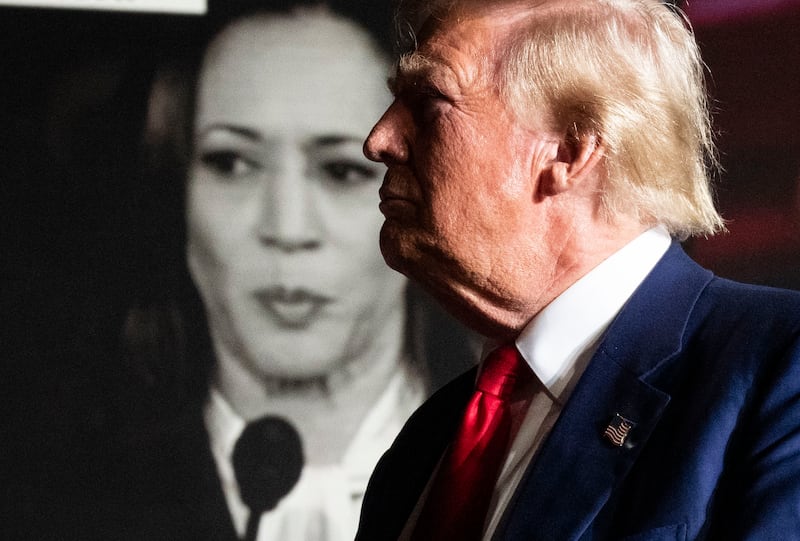 A campaign video for Kamala Harris appears behind Donald Trump during one of his rallies, in Las Vegas, in September. Photograph: Doug Mills/The New York Times
A campaign video for Kamala Harris appears behind Donald Trump during one of his rallies, in Las Vegas, in September. Photograph: Doug Mills/The New York Times
Biden told people that on the eve of the third anniversary of the Capitol Hill riots, something similar was at stake 246 years after WashingtonŌĆÖs heroics.
ŌĆ£Whether democracy is still AmericaŌĆÖs sacred cause is the most urgent question of our time, and itŌĆÖs what the 2024 election is all about. The choice is clear. Donald TrumpŌĆÖs campaign is about him, not America, not you. Donald TrumpŌĆÖs campaign is obsessed with the past, not the future. HeŌĆÖs willing to sacrifice our democracy, put himself in power. Our campaign is different. For me and Kamala, our campaign is about America. ItŌĆÖs about you. ItŌĆÖs about every age and background that occupy this country. ItŌĆÖs about the future weŌĆÖre going to continue to build together.ŌĆØ
As a broiling summer of record temperatures settled over the states, it felt as if the election was invaded by the spirit of a poltergeist
BidenŌĆÖs sentiments ŌĆō lofty, soaring, grave ŌĆō echoed the evening conversations of the commentariat. This would be a battle for a soul of the nation, all right. Nobody seemed to notice that in the grocery stores, Americans were more caught up in the more elemental battle of paying for their weekly cart of food or filling their cars with fuel. For many, routine luxuries were cut, and it made them miserable. In Iowa, Trump had offered a retort to his adversary which he would repeat at rallies through the year.
ŌĆ£HeŌĆÖs a threat to democracy because heŌĆÖs incompetent,ŌĆØ he said, accusing the president of orchestrating the four legal cases he was facing.
ŌĆ£HeŌĆÖs corrupted. HeŌĆÖs incompetent. He has no idea … He weaponised the DOJ and the FBI.ŌĆØ
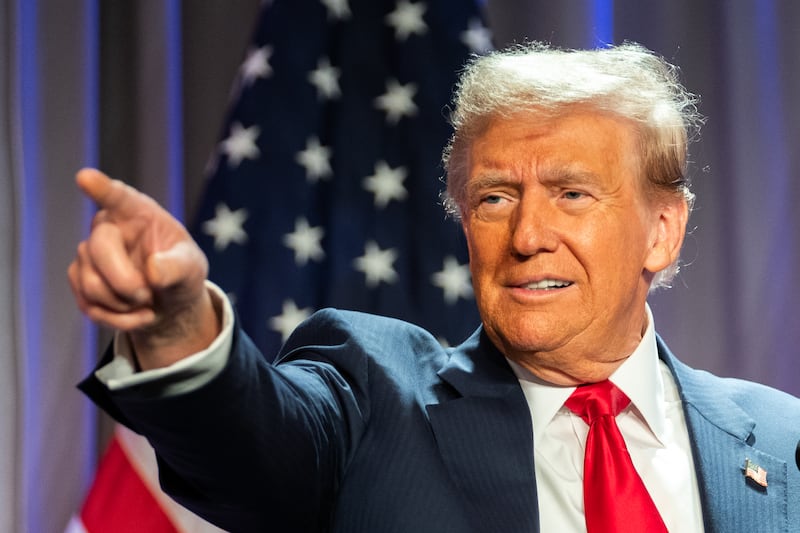 Donald Trump speaks at a House Republicans Conference meeting in Washington, DC in November. Photograph: Allison Robbert/Getty
Donald Trump speaks at a House Republicans Conference meeting in Washington, DC in November. Photograph: Allison Robbert/Getty
Trump was in dark, brooding form on his winter campaign in the Midwest. The year ahead, defined by the physical, financial and psychological burden of those trials, was weighing on him. But he crushed all pretense of a plausible Republican alternative by winning 98 out of the 99 counties in Iowa. Haley would hang around for another stubborn seven weeks, enduring TrumpŌĆÖs mocking taunt of ŌĆ£BirdbrainŌĆØ and angering him by claiming that he was ŌĆ£chaosŌĆØ.
But those 10 days of the Iowa snow served as a coda for the year ahead. Trump dominated the news and sucked up extraordinary volumes of oxygen. The Biden campaign was inevitably low key as the 80-year-old got on with the job of being president while waiting for the August convention to roll around. All the time, concern about his age flashed amber in approval ratings.
By mid-April, Trump was setting out on a daily trudge to an unglamorous courtroom in Centre Street in lower Manhattan for his ŌĆ£hush moneyŌĆØ trial. The gathering outside on the first morning was a 21st-century carnival of supporters and protesters. Arch Trump supporter and conspiracy theorist Laura Loomer was there, chanting through a loudspeaker and warning: ŌĆ£We are going to be here every single day talking to you fake news media freaks and letting you know that Donald Trump did nothing wrong.ŌĆØ Nearby, a flautist in a spangly waistcoat and with a huge banner declaring the former president to be a draft-dodger, played the Yankee Doodle Dandy. Andrew Guiliani, the son of former New York mayor-turned-Trumpite Rudy Giuliani, was in the square that morning too.
ŌĆ£He still has a great love and affection for New York. This is where Donald Trump became Donald Trump. I think a lot will be [about] what does the jury selection process looks like. If itŌĆÖs fair, Donald Trump gets acquitted. The case is far too weak, it never should have been brought,ŌĆØ he said.
Seven weeks later, Trump was found guilty on all 34 counts. Sentencing was delayed. The moment deepened the sense of America locked into a presidential election choice which the vast majority of the electorate dreaded. Two historically old candidates, trading verbal blows; accusation and counteraccusation. The mood was heavy and weary.
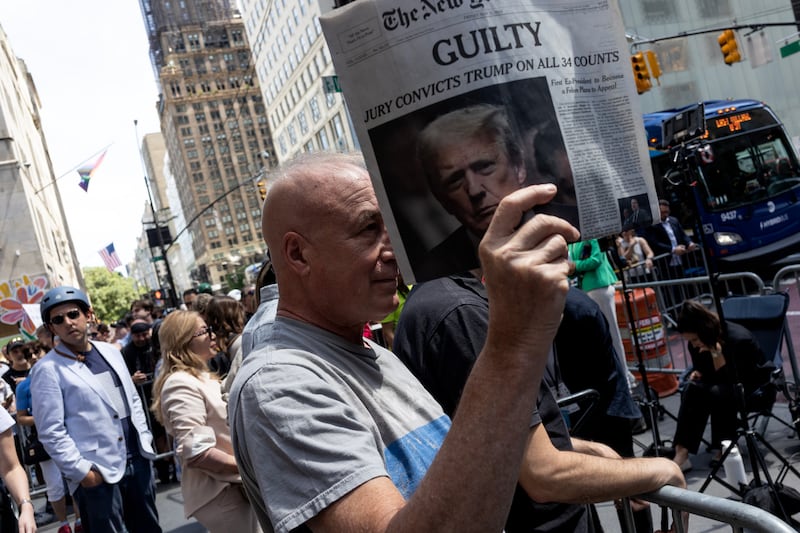 People outside Trump Tower on New York’s Fifth Avenue the morning after Donald Trump was convicted in Manhattan Criminal Court in the ‘hush money’ trial. Photograph: Andrew Lichtenstein/Corbis via Getty Images
People outside Trump Tower on New York’s Fifth Avenue the morning after Donald Trump was convicted in Manhattan Criminal Court in the ‘hush money’ trial. Photograph: Andrew Lichtenstein/Corbis via Getty Images
But as a broiling summer of record temperatures settled over the states, it felt as if the election was invaded by the spirit of a poltergeist. The phenomenal series of events of June, July and August hardly need recounting. First came BidenŌĆÖs implosion in his televised debate against Trump in Atlanta on June 28th. Republican surrogates were ecstatic when they entered the ŌĆ£spin roomŌĆØ afterwards. ŌĆ£TheyŌĆÖre a-ridinŌĆÖ with Biden,ŌĆØ proclaimed Matt Gaetz with mock glee. Nothing could spoil senator Lindsey GrahamŌĆÖs good mood, not even the impertinence of a British reporter who demanded of the South Carolinian, in clipped tones: ŌĆ£Is this the best AmericaŌĆÖs got?ŌĆØ Graham looked surprised before offering a drawled reply. ŌĆ£I think weŌĆÖre doing pretty good. Where you from? YouŌĆÖre tellinŌĆÖ me about a country? With your government?ŌĆØ
Then came the volley of bullets, on July 13th, across a true-blue summer sky in Pennsylvania. Thomas Crooks, the 20-year-old gunman, intervened on the election like a phantom: he turned up at the routine Saturday rally in Butler, found a vantage point on the roof of a storage shed, missed TrumpŌĆÖs head by millimetres, killed an innocent attendee, and was shot dead by snipers seconds later. Crooks left an unusually light digital imprint behind and the motivation for his assassination attempt remains obscure. Although Trump would repeatedly describe the moment when the bullet fizzed past his ear, he has seldom if ever mentioned his assailant by name.
Two nights later, Trump made a messianic entrance at the first night of the Republican national convention in Milwaukee. He had named JD Vance, the senator from Ohio who had once been a virulent critic, as his running mate. Vance was an unknown quantity, with his startling blue eyes, his newly acquired beard and his bestselling memoir, Hillbilly Elegy. He was a symbol of the new Republican Party, reimagined in TrumpŌĆÖs image with none of the gilded families ŌĆō the Bushes, the Romneys, the Cheneys ŌĆō to be seen. The feeling all week was of a coronation. The election was over.
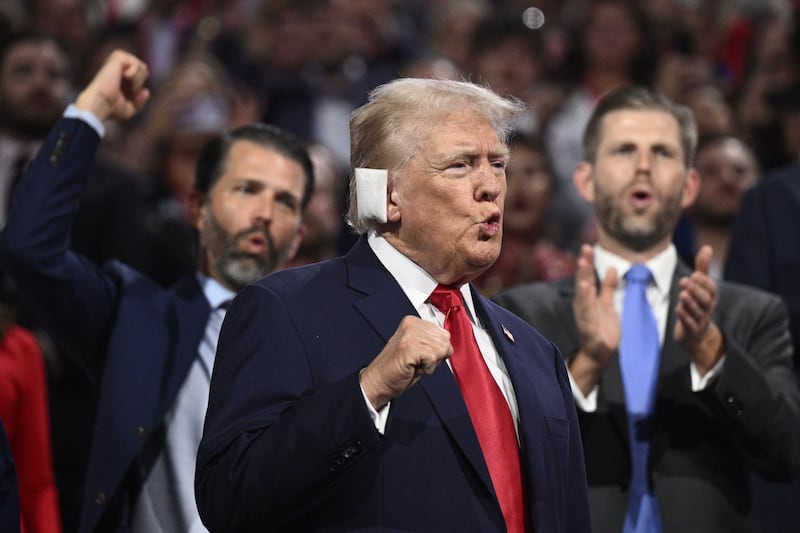 Donald Trump at the first day of the Republican national convention in Milwaukee in July, in the wake of a failed assassination attempt on him. Photograph: Brendan Smialowski/AFP via Getty Images
Donald Trump at the first day of the Republican national convention in Milwaukee in July, in the wake of a failed assassination attempt on him. Photograph: Brendan Smialowski/AFP via Getty Images
[┬Ā‘HillbillyŌĆÖ memoir analyses root causes of Trump phenomenonOpens in new window┬Ā]
And then a new election began. BidenŌĆÖs decision to drop out, on Sunday July 21st, after an intense period of reflection over a gloomy weekend in Rehoboth, had an instant, transformative effect. The Republican chorus cried foul. Kamala Harris shook off three years of incessantly negative media coverage to marshal a breathtakingly swift and organised campaign culminating in a starry August convention in Chicago that outshone the Republican week for pure euphoria. ŌĆ£JoyŌĆØ became the adopted theme word. Oprah yodelled it when she made an appearance. Hakeem Jeffries, the House minority leader, used it in a riff that drew on the Psalms. (ŌĆśWeeping may endure for a night, but joy comes in the morningŌĆÖ).
A reluctant media performer, Harris passed her first vital test by completely outshining and outsmarting Trump in their head-to-head debate in Philadelphia. Within an hour, Taylor Swift had consulted her political tea-leaves and decided that this was when she should offer a social-media endorsement of Harris. Democratic hearts swooned. The DonaldŌĆÖs feelings were wounded.
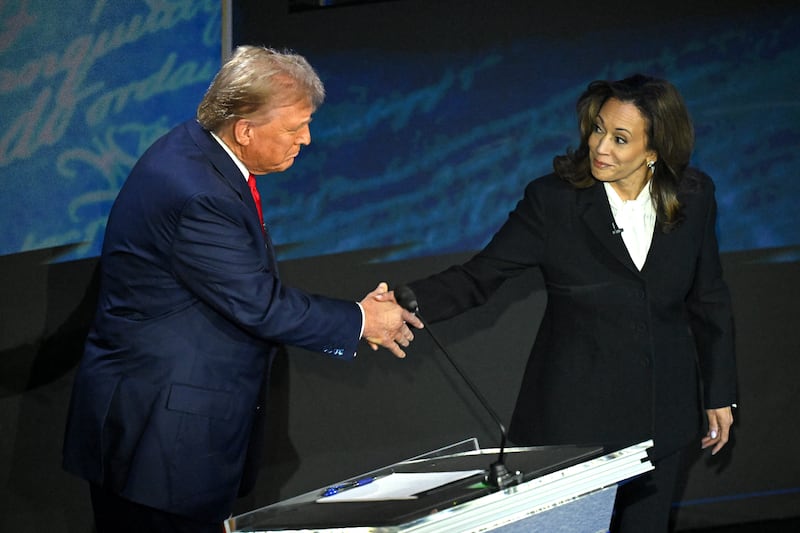 Kamala Harris shakes hands with Donald Trump before their televised debate in Philadelphia in September. Photograph: Saul Loeb/AFP via Getty Images
Kamala Harris shakes hands with Donald Trump before their televised debate in Philadelphia in September. Photograph: Saul Loeb/AFP via Getty Images
But Swift is nothing if not the savviest businesswoman in North America. She maintained a regal distance from Harris. Unlike Beyonc├® and Bruce and J-Lo, she never actually appeared with the candidate. The celebrity endorsements rolled in for the Harris campaign, but this was an election that may have burst the bubble on the old delusion of Hollywood star power.
Trump, meanwhile, had acquired a disparate collection of celebrity toys as he went. Hulk Hogan, the ageing wrestling phenom, remained a cheerleader all through, showing up at the convention wearing a fantastical shade of bronze and a red vest that he started to rip off before thinking better of it (The A/C in the Fiserv Arena was a tad icy, and the Hulk is 71 now). And by late summer, Trump had Elon Musk galumphing around the stage with him.
Soon, he would have Sly Stallone, the doe-eyed A-lister boasting a set of biceps that America first met during the Ford administration, in his corner. He even picked up a stray Kennedy, bringing Robert F Kennedy jnr into the fold after the 70-year-old ended his campaign as an Independent. This was an acquisition that delighted Trump and, sometimes when they were together on stage, you could catch Trump staring at BobbyŌĆÖs ageing kid, almost smitten. Together, this confederacy represented a sort of off-kilter machismo. By early autumn, the polling surveys were incessant. Nobody knew if they could be trusted ŌĆō and they gave no big news anyway. But the signs were that TrumpŌĆÖs bravura macho carnival was attracting a growing number of young American men, the most elusive category.
That Philadelphia debate might have been HarrisŌĆÖs finest hour ŌĆō and might also have been the moment when Trump decided to trust his instinct rather than his advisers. The rally speeches became more explicit and dark and epically long. America was a joke. Murderers, rapists and the insane were piling over the border. In Springfield, Ohio, ŌĆ£theyŌĆÖre eating the dogsŌĆØ. The attacks on Harris bordered on the unhinged: in September alone, Trump referred to her as ŌĆ£retardedŌĆØ, ŌĆ£mentally impairedŌĆØ and a ŌĆ£dummy.ŌĆØ
[┬ĀJoe Humphreys: Why ŌĆśtheyŌĆÖre eating the dogsŌĆÖ was a stroke of political genius by TrumpOpens in new window┬Ā]
The Maga-Republican supporters may have revelled in this stuff, but tens of millions other Republican voters just gritted their teeth and put up with it in the belief that for all his violent rhetoric, Trump would divert America from the disastrous path of deregulation and open borders and put them first again. If they listened closely, they could build something lovely and alluring from his words: a return to the era when an honest working wage could buy a house and support a family ŌĆō and still have enough to put away for small luxuries, for Saturday night beers, for the future. Their tiny precious slice of the American dream and to go on pursuing happiness.
In late October, I found myself in the livingroom of Ngoc Tran and Kevin Moynihan. They live on Summit Avenue, in St Paul, Minnesota, which is one of the more gorgeous residential streets in America. The governorŌĆÖs mansion, where Tim Walz resides, was just down the road. More fascinatingly, the house where F Scott Fitzgerald had spent his unhappy adolescence and wrote the first draft of Tender Is The Night, was two doors down. The sun was bright, the leaves sparkled, and the Halloween decor was the last word in subtlety. Like many Americans, the Moynihans are deeply hospitable ŌĆō did I, a blank stranger, need a place to stay while in St Paul? Should they cook?
I was there to listen to the couple explain why they had turned full circle from ardent Democratic voters to Trump-voting Republicans.
The couple are a classic American story. NgocŌĆÖs family came from Vietnam as ŌĆ£boat peopleŌĆØ in October 1979.
ŌĆ£I was 16. It was wonderful,ŌĆØ she told me in perfect, lightly accented English.
ŌĆ£First of all, when we escaped and got to Malaysia we were in a refugee camp for 9┬Į months. That wasnŌĆÖt so pretty. And we were very hopeful and focused when we came here. But we adjusted quite quickly when we came here. My mother back in 1956 came to Minnesota for college and got a MasterŌĆÖs in Loyola. So, in the refugee camp she wrote to the dean of the school and they sponsored our family. And I ended up going to the same college as my mother, St Catherine University.ŌĆØ
Ngoc met Kevin in his home city of Boston. They lived in LA for a while and then decided on St Paul, where they raised two girls who are now through college. They continue to enjoy good careers as insurance professionals. Kevin hasnŌĆÖt lost the Boston brogue nor the cityŌĆÖs line in acidic humour. He talks about the moment he began to feel isolated not just from the Democratic Party but from the liberal, progressive national conversation.
More than 155 million Americans cast their vote in 2024. But a further 89 million people simply did not bother. What does that mass indifference say about the soul of America?
ŌĆ£When Hillary Clinton announced she was running, I couldnŌĆÖt believe they put her up. It was Bush-Clinton, these constant same people. We watched CNN all the time then. And we went to a Bernie Sanders rally in St Paul. And we really liked a lot of what he said. But CNN had Trump on every night. And it was only CNN. And they were clearly mocking him at the same time. And I thought at times: wait, he makes a good point here. I did not vote for him because I thought he had no chance, that it would be a Clinton landslide. But Trump won! And the next day I switched to Fox because I felt I had been lied to. I was really disillusioned at that point.ŌĆØ
In the years since, Kevin found himself calling out what he sees as Democratic shortcomings and hypocrisies on Facebook posts. He says he has lost a lot of his old high school pals back in Boston. And in St Paul, too. ItŌĆÖs a heavily Democratic city, but the couple share concerns with the way it has been governed and what they see as the hollowing-out of the once-thriving city centre.
The easier thing to do would be to stay quiet and say the right things. Instead, they no longer go to the charity cocktail parties they once had. ThatŌĆÖs fine with Kevin. All four of his grandparents came from Ireland ŌĆō grandmothers from Leitrim and Roscommon and both grandfathers from Kerry. His second cousin is the Kerry footballer Dara Moynihan. Last year, the couple visited all four homesteads. It was, he says ŌĆ£the trip of a lifetimeŌĆØ.
ŌĆ£And I made it happen,ŌĆØ Ngoc jokes. Kevin laughs that, at 60, he is content to become an urban version of the isolated Kerry hillside farmers of old.
ŌĆ£You know, NgocŌĆÖs mom grew up in Hanoi and they fled the communists after World War two and then left Saigon. She said about this election: this is my third time and it feels very similar to the first two. I think of us as turning more like Europe ŌĆō into a Democratic social movement. We donŌĆÖt mind paying taxes ŌĆō at all. But it seems like everything has been taken to the extreme. And that is the problem.ŌĆØ
About a week before the election, on a sublime evening in Washington, about 70,000 people turned up to try to see Harris speak at the Ellipse. The energy around the city was incredible: it felt like a popular movement with an irresistible momentum. Just a 10-minute walk away, among the many splendours to be found in the nearby museums, is a military costume worn by George Washington himself, and various artefacts recovered from that bitter winter in Valley Forge that Biden mentioned.
Washington city is the nationŌĆÖs capital but it had also become TrumpŌĆÖs symbol of a fallen country: the complacent, corrupt meddlesome heart of bureaucratic mediocrity. With Musk, the worldŌĆÖs richest man by his side, he promised he would rip it up and start again.
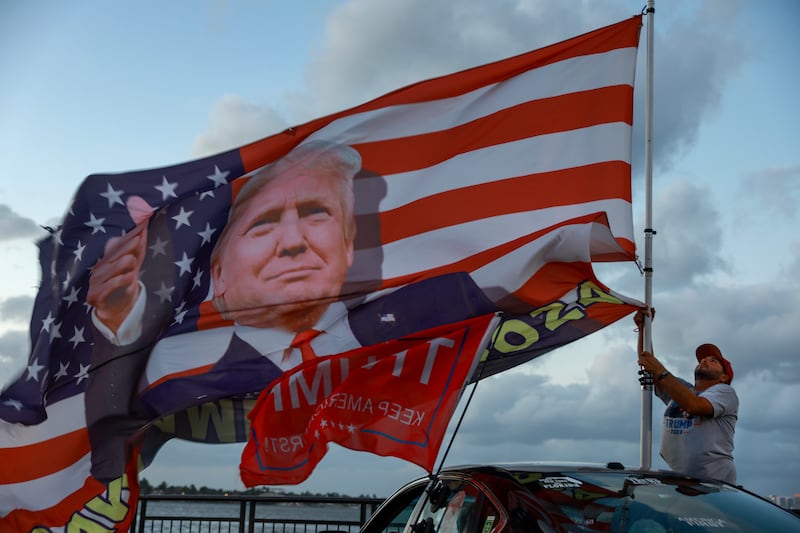 A man shows his support for Donald Trump near his Mar-a-Lago resort in Palm Beach, Florida on November 13th. Photograph: Joe Raedle/Getty Images
A man shows his support for Donald Trump near his Mar-a-Lago resort in Palm Beach, Florida on November 13th. Photograph: Joe Raedle/Getty Images
Long before midnight on November 5th, it was clear that Trump would return for a second term in the White House. Even his harshest critics acknowledged that Trump is a once-in-a-lifetime master manipulator of the unseen energies that sway the electorate. The victory places Trump among those rare political figures to have loomed over the American political landscape and society for a dozen-plus years. He is in the process of changing America in ways that will reverberate through the country long after he is dead.
[┬ĀMartin Wolf: What makes the US truly exceptionalOpens in new window┬Ā]
The mood in Howard University on election night, where a predominantly black crowd had gathered in the hope of witnessing a historic moment, turned funereal. The quietness after midnight was terribly dignified and sad. Harris did not appear on stage until Wednesday afternoon, when she gave an upbeat concession speech. By then, the inquest had begun.
In the following weeks, it was argued that Harris was the wrong candidate. It was argued that she ran the best campaign imaginable over the course of 100 days. Biden was blamed for not getting out of the road earlier. The argument that Harris didnŌĆÖt win because of an underlying strain of sexism and racism at the heart of American society was forwarded.
[┬ĀPodcast giant Joe Rogan may have played key role in US electionsOpens in new window┬Ā]
An existential internal Democratic reckoning was under way. Who was the party even for any more? Almost half of Latino voters and a quarter of black men who voted did so for Trump. He had cut into Democratic strongholds such as New York. He won the White House, the House, the Senate and had already reshaped the supreme court in his last term.
The most significant figure was the one least mentioned. More than 155 million Americans cast their vote in 2024. But a further 89 million people simply did not bother. What does that mass indifference ŌĆō or despair, or alienation ŌĆō say about the soul of America?
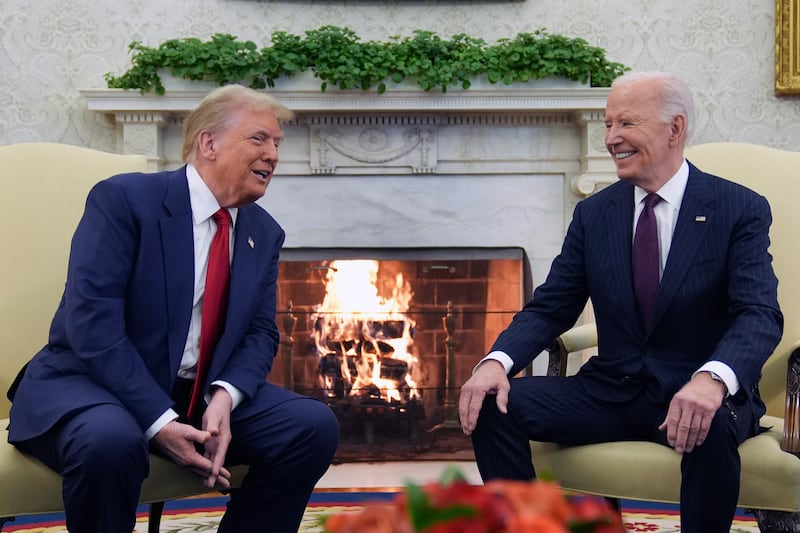 Joe Biden and Donald Trump in the Oval Office of the White House in November. Photograph: AP Photo/Evan Vucci
Joe Biden and Donald Trump in the Oval Office of the White House in November. Photograph: AP Photo/Evan Vucci
On November 13th, Trump returned to the White House for the first time since 2021. He sat with Biden in the Oval office in front of a blazing, needless fire ŌĆō it was an unseasonably hot day.
It is no great thing to have grace in victory, but Trump seemed a little humbled by BidenŌĆÖs old-fashioned show of largesse.
ŌĆ£Politics is tough and in many cases itŌĆÖs not a very nice world,ŌĆØ Trump offered.
ŌĆ£But it is a nice world today, and I appreciate very much a transition thatŌĆÖs so smooth.ŌĆØ
A nice world today. After all those months of poisoned political discourse, the moment carried a shocking echo of a more refined and civil tradition among American presidential figures of the past. Here they were, the two ageing men who have become the figureheads of the unbreachable divide among Americans. Sitting upright in their dark, tailored suits, the bust of the late Robert F Kennedy looking on in the background. Biden and Trump. Together at last.
Source link : http://www.bing.com/news/apiclick.aspx?ref=FexRss&aid=&tid=67665e51683d432e88e132ac7fa8507b&url=https%3A%2F%2Fwww.irishtimes.com%2Flife-style%2Fpeople%2F2024%2F12%2F21%2Fkeith-duggan-trump-is-changing-america-in-ways-that-will-reverberate-long-after-he-is-dead%2F&c=2941339141063549023&mkt=en-us
Author :
Publish date : 2024-12-20 17:00:00
Copyright for syndicated content belongs to the linked Source.












